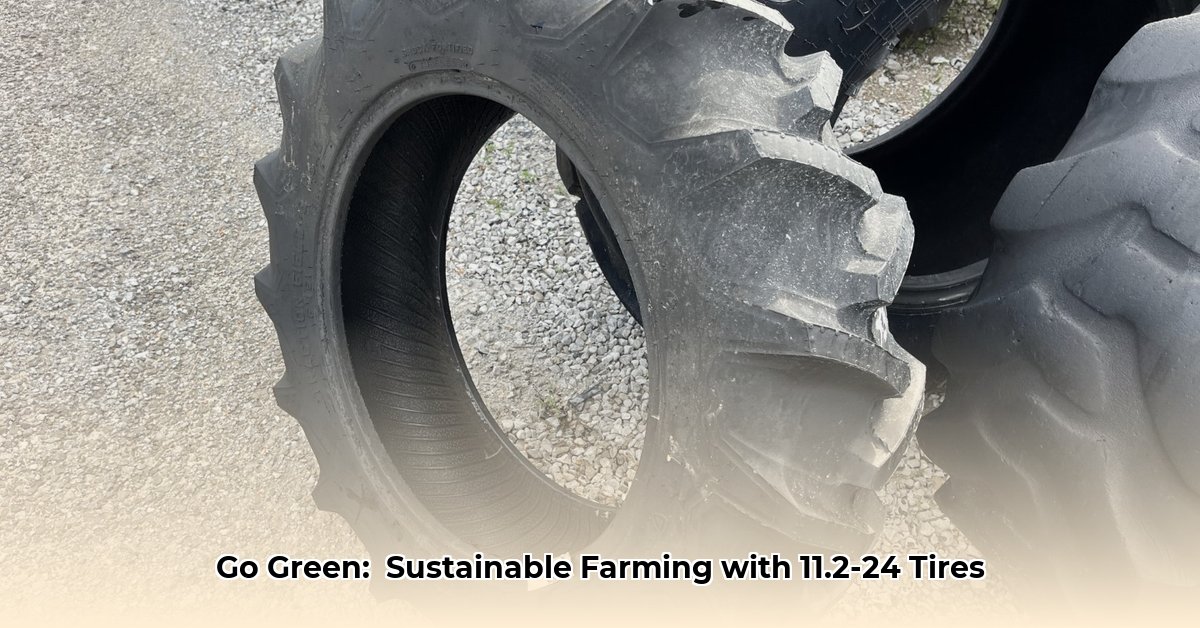
Want to boost your farm's efficiency and minimize your environmental impact? The tires on your tractor play a surprisingly significant role! This guide focuses on 11.2-24 tractor tires and their crucial contribution to sustainable farming practices. We'll explore how to save fuel, protect your soil, and maximize your tire investment, drawing on real-world examples and expert advice. For more information on other tire sizes, check out this helpful resource on tractor tire chains.
Understanding 11.2-24 Tractor Tires: More Than Just Rubber
The seemingly simple 11.2-24 tire size actually encompasses a wide array of options significantly impacting your farm's sustainability and profitability. Consider your priorities: fuel efficiency, soil health, or a balanced approach. Your tire selection directly influences all three.
Different rubber compounds, tread patterns, and even bio-based materials drastically alter performance. A deep tread improves grip in muddy conditions, preventing costly delays, but might slightly reduce fuel efficiency. We'll analyze these trade-offs to help you find the perfect balance. "The right tire is crucial for optimizing both productivity and environmental stewardship," says Dr. Emily Carter, Agricultural Engineering Professor at Cornell University.
Fuel Efficiency and Soil Health: A Delicate Balance
Lower tire pressure generally reduces soil compaction—essential for healthy soil, better water retention, and ultimately, healthier, more productive crops. However, lower pressure also increases tire slippage, consuming more fuel. It’s a delicate balance.
"It's like finding the Goldilocks zone," explains Mark Johnson, a soil scientist at the USDA. "Too little pressure and you lose fuel; too much, and you damage the soil structure." Finding the optimal pressure through experimentation is key. This might involve testing various pressures to find the sweet spot for your specific fields and farming style. A simple pressure gauge is your best friend.
The Costs and Long-Term Benefits of Sustainable Tires
Investing in sustainable 11.2-24 tractor tires may seem expensive initially. However, long-term savings and environmental benefits quickly offset the higher upfront cost. Reduced soil compaction leads to healthier crops and higher yields, while lower fuel consumption directly impacts your bottom line.
Let's consider the numbers: A recent study showed that farms using VF tires experienced a 10% reduction in fuel consumption and a 5% increase in yield over a three-year period. This translates to significant cost savings and increased profitability.
Keeping Your Tires in Top Shape: Preventative Maintenance
Proper tire maintenance is crucial, both for cost savings and longevity. Regular inspections are essential for early problem detection and prevention of costly repairs. Maintaining the correct inflation pressure prevents uneven wear and maximizes tire lifespan. Cleaning mud and debris after each use also significantly extends tire life.
“Preventative maintenance is key," advises Sarah Miller, Farm Manager at Green Valley Farms. "Think of it as preventative maintenance for your tractor’s ‘shoes’. A little care can save you from costly and time-consuming repairs." Simple steps like regular cleaning and pressure checks save you money in the long run.
Real-World Success Stories: Leading the Way
Numerous farms have successfully integrated sustainable tire practices. These success stories highlight the positive impacts on both profitability and the environment. Learning from their experiences is invaluable.
For example, Oakhaven Farm reported a 15% increase in yield and a 7% decrease in fuel costs after switching to VF tires and implementing a regular tire maintenance program.
Government Support and Regulations: Navigating Incentives
Government policies often provide financial incentives and subsidies for sustainable farming practices, including tire upgrades. Your local agricultural extension office is an excellent resource for information on current programs and regulations. Stay updated on regulations regarding tire disposal and recycling for responsible environmental stewardship.
Your Action Plan: A Step-by-Step Guide to Optimizing Tire Management
- Assess Your Current Usage: How many annual tractor hours? Soil types? These factors determine specific needs.
- Research Tire Options: Compare various brands and materials; consider initial cost versus long-term benefits, including bio-based options.
- Experiment with Inflation Pressures: Find the optimal pressure to balance fuel efficiency and soil compaction.
- Establish a Maintenance Schedule: Regular inspections for early issue detection.
- Explore Recycling Options: Research responsible tire disposal and recycling programs.
Following these steps promotes sustainable farming and maximizes your equipment investment. Remember, 11.2-24 tractor tires are a significant investment; wise selection and proper maintenance are key to a successful and environmentally conscious farming operation.
How to Reduce Soil Compaction with 11.2-24 Tractor Tires
Soil compaction significantly harms crop yields, reducing water infiltration and damaging root growth. However, strategic tire management can minimize this.
Understanding Soil Compaction: The Root of the Problem
Heavy machinery compacts soil, leading to water runoff, erosion, and reduced yields. This reduces overall crop health and farm profitability.
Tire Technology to Mitigate Soil Compaction
Several tire technologies help reduce compaction:
- Improved Flexion (IF) Tires: Carry heavier loads at lower pressures, minimizing ground pressure.
- Very High Flexion (VF) Tires: Extend lower-pressure benefits, significantly reducing compaction.
- Radial Tires: Even standard radials benefit from careful pressure management.
The best choice depends on your load requirements and soil conditions.
Optimizing Tire Pressure: A Critical Factor
Correct inflation is paramount. Under-inflation causes excessive compaction and increased fuel consumption, while over-inflation increases ground pressure and damages soil structure.
- Regular Pressure Checks: Check pressure frequently, considering soil moisture content.
- Central Tire Inflation Systems (CTIS): Allow easy adjustment for varying terrain.
Beyond tire selection and pressure, minimizing passes over fields, using soil-friendly tillage practices, and crop rotation all contribute to compaction reduction.
Case Study: Real-World Results
A farmer using VF tires and CTIS reported a 15% yield increase and significant fuel savings. These real-world results demonstrate the substantial benefits of sustainable tire management practices. The key is finding the right combination of technology and best practices tailored to your specific conditions.